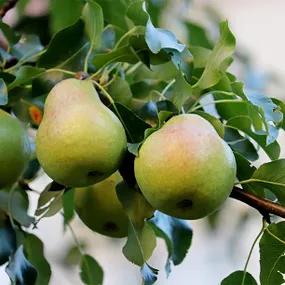Buying Pear Trees Online:
Order Potted Pear Trees Now For August Delivery
Pre-Order Bareroot Pear Trees For 2025/26 Winter Season
Pear trees grow wonderfully well in the UK, as they love moisture in summer, cold winters, and thrive in clay soils.
A lusciously sweet and melt-in-your mouth-juicy dessert pear has few equals when perfectly ripe, and cooking pears used to be a humble staple of British sweet and savoury dishes: in our house, they still are!
Buying Pear Trees
The most popular pear varieties are available pot grown year round.
Barerooted pear trees are delivered between November and the end of March, the winter planting season.
- Order now, pay later: we don't charge your card until before delivery
- When your order is ready: your mail order fruit trees are delivered by next working day courier (not the next working day after ordering!)
- Friendly support: if there is anything wrong with your plants when you inspect them, Contact Us within 5 working days
All bareroot plants are covered by our Refund Guarantee, so you can give them a whirl with complete confidence.
Browse all our other fruit trees.
Pear trees are easy to establish in your garden and are a great asset. They do well positioned in a sunny spot in the ground or a pot.
Which Pear Tree Variety Should I Choose?
Dessert pears are a little more demanding of sun and shelter than apples, while cooking pears generally tolerate partial shade well.
In the North and Scotland, most dessert pears are best grown against South facing walls to guarantee a great crop every year, otherwise an overcast summer may give disappointing results.
Williams bon Chretien is an exception: highly recommended for colder regions, and it can even make some fruit on a North facing wall.
The most reliable dessert pears for the home grower are Onward and Louise Bonne of Jersey, which have better disease resistance and lower requirements than the great classics like Comice, Concorde, or Conference - not that you should be put off growing those, but if you can only have one tree then it pays to have a sure bet.
We sell one pear intended for perry, or pear cider, Hellens Early.
Invincible and Winter Nellis are both excellent dual-purpose pears: mainly used for cooking, but quite serviceable as eaters later in the season after some time ripening off the tree.
Where Can I Grow Pear Trees?
The best place to plant pear trees is in a sunny spot with well drained, fertile soil that has neutral to mildly acidic pH.
They love heavy clay soil, as long as the site does not waterlog in winter.
Shelter from strong winds is also good.
Dessert pears are a little more demanding of sun and shelter, while cooking pears generally tolerate partial shade well.
If your soil is poor, you can improve it by digging in well rotted organic matter, then mulching well every year.
Remember that because mulch is not dug into the soil, it does not need to be rotted.
When and How do I Plant my Pear Tree?
When is the best time to plant Pear trees?
The best time to plant pear trees is in winter, using bareroot stock.
Pot grown trees can be planted at any time during the rest of the year, as long as you are absolutely certain to water them well.
There are pros and cons to every season, but as long as you water well in dry weather until your tree is established, you can plant at any time.
How to Plant a Pear Tree
You have two main choices with cherries. Either grow them:
- As a normal freestanding tree in the "bush" form (with a short trunk under 1.2 metres) or half-standard form (with a trunk between 1.2 and 1.5 metres tall)
- As a fan, trained flat using support wires (usually against a wall).
Watch our Fruit Tree Planting video, (we highly recommend using Rootgrow).
Pear trees must be planted at the same depth in the ground as they were in the pot or ground before being transplanted.
Growing fruit trees requires nutritious soil, with good levels of moisture retention, so improve sandy or poor soils with well rotted organic matter before planting.
Heavy clay soil does not need improving, only mulch afterwards.
When and How do I prune pear trees?
It’s essential to prune your pear tree each year to control its growth and encourage new fruit.
The best time to prune your pear tree in the UK is on a frost-free day during late winter, February to early March, while it's dormant, but any time between late Autumn and early Spring is fine.
However, there is no harm in pruning your pear tree at other times of year.
In the case of restricted forms that are trained on wires, like espaliers, cordons, and step-overs, summer pruning is used in addition to winter pruning to control the vigour of the tree.
As always, remove DDD wood at any time: Dead, Damaged, or Diseased.
How to Prune Pear Trees
- Pruning maidens into bushes or half-standards.
- Pruning bushes or half standards (this is year two if you start with a maiden, or year one if you buy ready-made bushes / half standards).
- Pruning cordons.




 1.webp)

 1.webp)
 1.webp)
 1.webp)
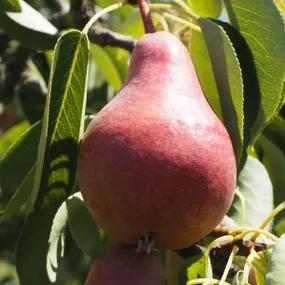
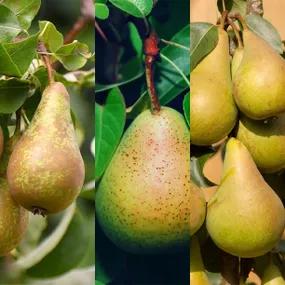
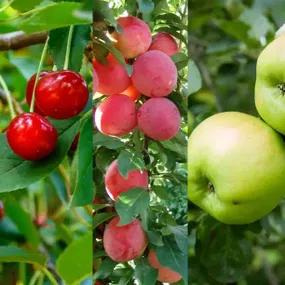
 1.webp)
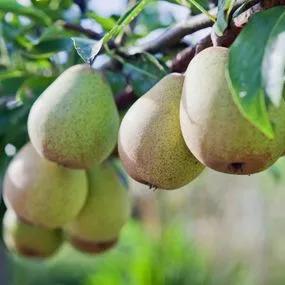
 2.webp)
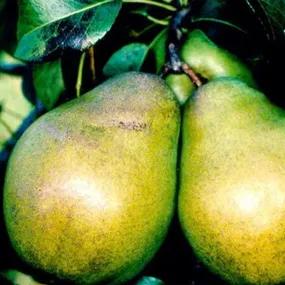
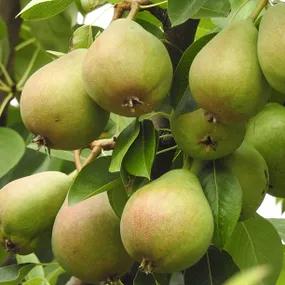
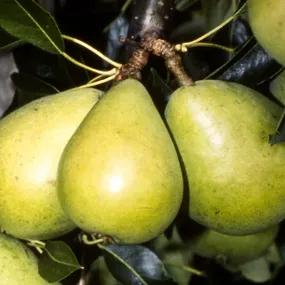
 1.webp)
